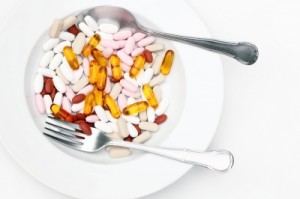Is it possible to get too much of a good thing, like too much vitamin B12, or too much of any vitamin, for that matter? Experts say yes- overdoing it on certain vitamins can cause vitamin toxicity, and the damage can range from annoying to severe. So before you down a bottle of vitamin C for immune system health, have a look at what health experts have to say about vitamin B12 and others.
Vitamin B12- How much do you need?
Vitamin B12- What is it?
Vitamin B12 (cobalamin) is a water-soluble vitamin that occurs naturally in animal-based foods like beef, chicken, fish, eggs, and milk. Vitamin B12 supports many vital bodily functions, like shielding your nerve cells through myelin production, maintaining healthy red blood cells, aiding in DNA synthesis, enhancing cognitive functioning, and increasing stamina.
If you don’t have enough vitamin B12 in your blood, then you may get vitamin B12 deficiency, which causes symptoms like
- fatigue
- depression
- frequent forgetfulness
- brain fog
- low attention span
- painful “pins and needles” and numbness in the hands and feet
- stomach problems
- decreased motor control
- muscular weakness
- impaired walking
Vitamin toxicity
According to the Institute of Medicine’s list of Tolerable Upper Intake Levels, certain vitamins like vitamin B12 are safe to take in mega doses, while other vitamins must be used in moderation. Taking too much of a certain vitamin may result in stomach discomfort, birth defects, or organ damage, according to many published studies.
Below is a list of vitamins, including recommended daily amount and risks of vitamin toxicity:
Vitamin B12
There is no upper limit for taking vitamin B12, according to the Institute of Medicine. That means that you can experiment with as much vitamin B12 as you like without causing any damage. Any amount that your body doesn’t use is excreted with your urine.
How much vitamin B12 do you need? Scientific evidence suggests that even people who don’t have vitamin B12 deficiency gain enormous health benefits- increased energy and mental alertness- by taking generous doses of vitamin B12.
- One clinical study focusing on high-dose vitamin B12 found that taking 2,500-5,000 mcg of vitamin B12 every few days led to a 50%-80% increase in stamina, mental focus, and overall wellbeing after only a few weeks.
- In a double-blind crossover study on vitamin B12 for treating tiredness, people who suffered daily fatigue but didn’t have vitamin B12 deficiency or chronic fatigue syndrome (CFS) experienced a boost of stamina, enhanced concentration skills, and improved mood after taking 5,000 mcg of vitamin B12 twice daily for two weeks.
- Another study on people who didn’t have low vitamin B12 levels resulted in similar findings with varied doses of vitamin B12, from 3,000 mcg four times per week to 9,000 mcg daily.
Also read: Will Vitamin B12 Boost Energy if I don’t have B12 Deficiency? YES!
Vitamin A
The upper limit for vitamin A supplementation is 3,000 IU for adult males and females. Health experts strongly advise meeting your vitamin A requirement through dietary sources like eggs, fortified milk, and liver, as opposed to pill form. Unless you have vitamin A deficiency, a risk factor for Crohn’s disease and celiac disease, there is no need to supplement with extra vitamin A.
Vitamin A toxicity may result in:
- Nausea
- Vomiting
- Dizziness
- Headache
- Blurred vision
- Muscular weakness
- Skin peeling
- Liver fibrosis
- Birth defects
- Damage to the central nervous system
- Osteoporosis
- 18% increased risk for lung damage.
Vitamin C
The upper limit for vitamin C is 2,000 mg per day for adult males and females. Food source of vitamin C include citrus fruits, broccoli, sweet potatoes, and bell peppers. While vitamin C is essential for immune system health, there is inadequate scientific proof that taking extra amounts of vitamin C will help to ward off a cold or reduce cold symptoms.
Vitamin C toxicity may result in:
- Diarrhea
- Stomach cramps
- Nausea
- Flatulence
- Kidney stones
Vitamin D
The Institute of Medicine recommends taking no more than 100 IU of vitamin D per day, unless you have vitamin D deficiency. While it is not possible to get too much vitamin D from sun exposure, taking excess vitamin D in pill form may cause vitamin toxicity.
Vitamin D toxicity may result in:
- Rapid uncontrolled weight loss
- Polyuria (excess urine secretion)
- Heart arrhythmias
- Heart and kidney damage from excess calcium levels in the blood
- Kidney stones
Vitamin E
The maximum daily dose of vitamin E is 1,000 IU for adult males and females. Dieticians recommend getting your vitamin E from food sources like wheat germ, sunflower seeds, and broccoli, as opposed to taking vitamin E pills.
Vitamin E toxicity may result in:
- Increased risk for hemorrhagic stroke
- Osteoporosis
Please tell us…
Do you have vitamin deficiency, such as vitamin B12 deficiency or vitamin D deficiency? How has vitamin deficiency impacted your life, now that you have been diagnosed? Are you aware of any vitamin toxicity symptoms that are not included in this article?
Spread the love…
Know anybody who could be helped by this information? Please share this article on Facebook, Google+, or by emailing a link.
We love to hear from you…please feel free to leave comments, suggestions, or questions below!
Read more about vitamin B12 deficiency:
Tired of being Tired all the Time…It’s Tiring!
Diagnosing Vitamin B12 Deficiency and Pernicious Anemia: Top 10 Tests
What are the Symptoms of Pernicious Anemia- B12 deficiency?
Sources:
Dietary Reference Intakes (DRIs): Tolerable Upper Intake Levels, Vitamins
Dietary Supplement Fact Sheets
Vitamin B-12: placebo or neglected therapeutic tool?
A pilot study of vitamin B12 in the treatment of tiredness
Deficiencies You Can Deal With
Images:






